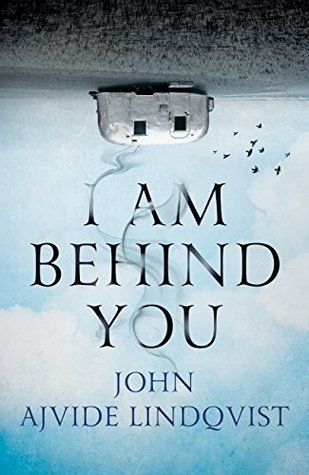 By JOHN AJVIDE LINDQVIST (St. Martin’s Press; 2018)
By JOHN AJVIDE LINDQVIST (St. Martin’s Press; 2018)
A new novel by John Ajvide Lindqvist, Sweden’s current master of all things horrific. Lindqvist has been called “Sweden’s Stephen King,” and I AM BEHIND YOU only furthers the comparison, with a conception that’s quite similar to that of King’s UNDER THE DOME. The major difference is in Lindqvist’s approach to his characters; King made clear delineations between good and bad people, whereas in Lindqvist’s far less forgiving universe everyone is susceptible to madness and murder. As is stated in a quasi-nonfictional opening page, about ordinary human flaws and the effects of strain upon them, “just like everything else they can reach a critical mass, a point where they change character and become something else.” In keeping with that unforgiving worldview, the arc of I AM BEHIND YOU is profoundly bleak.
The situation is this: four families, caravanning at a remote campsite, awaken one morning to find that they’re situated in a vast expanse of grass that stretches as far as the eye can see. The characters include two children, a bickering married couple, a pair of closeted male farmers, a dog and a cat. All are understandably flummoxed by this development, and attempt to find a way out of the expanse by embarking on marathon drives that yield only more grass.
It soon becomes clear that the human characters aren’t alone. A quartet of dark figures emerge from the distance, appearing in different guises that correspond to the characters’ individual fears and prejudices. This leads to elaborate flashbacks in which horrific secrets are uncovered, leading inexorably to paranoia and madness. Yet the horror without is just as toxic, as evinced by the clouds massing on the horizon that are set to disgorge some highly corrosive acid rain.
Powerful stuff, although I AM BEHIND YOU is not quite the genre masterpiece Lindqvist was clearly aiming for (and in his previous novels LET ME IN and LITTLE STAR actually achieved). It suffers from a lack of narrative momentum, which is especially jarring given the highly expansive 405 page length. Another problem, for non-Swedish readers at least, is with the innumerable references to Swedish culture and politics; the entire story, in fact, seems to have been intended as a commentary on modern-day Sweden (whereas LET ME IN and LITTLE STAR worked primarily because of their universality). But the power of Lindqvist’s present tense prose (ably translated by Marlaine Delargy), with its eye for quirky character-based detail and pitiless insight into the darker corners of the human psyche, is fully evident in any language.
